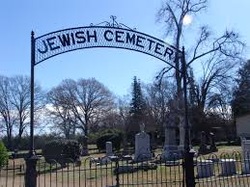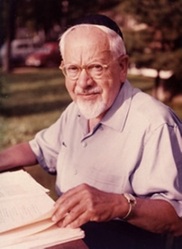
My mother always says that people die by inches. When I look back on my life, I can certainly recall those who passed away in an accident or due to a sudden body failure, but I have also been witness to the gradual process of death. Whether it be by cancer or Parkinson’s or Alzheimer’s or the slow decline associated by old age, death can creep up on us at a snail’s pace.
My godfather never accepted this possibility. A giant of a man, his doctors told him that if he didn’t refrain from his gourmet lifestyle, he would surely die in a matter of two years. He decided that he would prefer to leave this world enjoying his opulent dinners at five star restaurants. The problem was that he didn’t anticipate that his demise would be agonizingly slow, robbing him of his bodily functions one by one and leaving his family to care for him in his diminished state.
In this week’s Torah portion Hukkat, two important characters in the story of the Jewish people die…Miriam and Aaron. The text tells us, “The Israelites arrived in a body at the wilderness of Zin on the first new moon, and the people stayed at Kadesh. Miriam died there and was buried there.” Later in the portion, God says “strip Aaron of his vestments and put them on his son Eleazar. There Aaron shall be gathered unto the dead…and Aaron died there on the summit of the mountain.” When I think back on the parshas we have read since Simchat Torah, it seems that the death of the bible is frequently swift and matter of fact…whether it be by natural causes or an act of aggression. We aren’t given a whole lot of detail regarding long illnesses or the perils of an aging body.
There is an old Hasidic saying that death is as painless as pulling a hair out of a bowl of milk. However, that comment refers to the moment of death. So, what about the time leading up to that instant?
According to Rabbi Dayle Friedman, despite medical advances that have lengthened the span of life from under 50 years at the turn of the 20th century, to close to 75 today, we have not succeeded in evading facility and finitude. Our society is loathe to acknowledge and accept the seeming inevitability of the physical and mental deterioration of most older people. This has serious consequences such as the isolation of the elderly, the denial of aging and a loss of self respect among elders.
I see these scenarios currently playing out in my own life. My mother is very lonely in her one bedroom apartment, but refuses to consider a retirement community as this would indicate to her and all the world that she is elderly. Despite my father-in-laws early dementia and balance issues, he and my mother-in-law refuse to move from their upstairs bedroom to the one on the first floor of their house despite the steep stairs they must navigate throughout every day.
From the Psalms we are told “Do not cast me off in old age; when my strength fails, do not forsake me. (Psalm 71:9).” It is frightening to accept the truth of aging when we fear that we will be abandoned by our families, our friends, and even God. It is also difficult to contemplate the inevitable losses that we will surely face. But, pretending that the aging process is nonexistent does not actually forestall the inevitable. And, it robs us of our power to create a happy, productive, and safe twilight years.
Who is rich? The one who is
happy with what he or she has.”
Pirke Avot teaches that we access treasures by acknowledging and accepting reality; we suffer when we attempt to be somewhere other than where we are.
I told my 20 year-old daughter that she need not worry about managing my old age. I vowed to her that I will make plans for myself, anticipating each stage of transition, and accepting the changes that are required. For me, accepting this truth, will free me to concentrate on the ways that I can still contribute rather than spending my energy resisting what is.
So, as we each face our personal journeys through aging, let us remember that a positive and truthful outlook can fulfill the ancient vision that the Psalmists had for us:
The righteous will flourish like the palm tree:
They will grow like a cedar in Lebanon.
Planted in the house of the Eternal,
They shall flourish in the courts of our God.
They shall yet yield fruit even in old age;
Vigorous and fresh they shall be,
To proclaim that the Eternal is just!
[God is] my Rock, in whom there is no injustice.
My godfather never accepted this possibility. A giant of a man, his doctors told him that if he didn’t refrain from his gourmet lifestyle, he would surely die in a matter of two years. He decided that he would prefer to leave this world enjoying his opulent dinners at five star restaurants. The problem was that he didn’t anticipate that his demise would be agonizingly slow, robbing him of his bodily functions one by one and leaving his family to care for him in his diminished state.
In this week’s Torah portion Hukkat, two important characters in the story of the Jewish people die…Miriam and Aaron. The text tells us, “The Israelites arrived in a body at the wilderness of Zin on the first new moon, and the people stayed at Kadesh. Miriam died there and was buried there.” Later in the portion, God says “strip Aaron of his vestments and put them on his son Eleazar. There Aaron shall be gathered unto the dead…and Aaron died there on the summit of the mountain.” When I think back on the parshas we have read since Simchat Torah, it seems that the death of the bible is frequently swift and matter of fact…whether it be by natural causes or an act of aggression. We aren’t given a whole lot of detail regarding long illnesses or the perils of an aging body.
There is an old Hasidic saying that death is as painless as pulling a hair out of a bowl of milk. However, that comment refers to the moment of death. So, what about the time leading up to that instant?
According to Rabbi Dayle Friedman, despite medical advances that have lengthened the span of life from under 50 years at the turn of the 20th century, to close to 75 today, we have not succeeded in evading facility and finitude. Our society is loathe to acknowledge and accept the seeming inevitability of the physical and mental deterioration of most older people. This has serious consequences such as the isolation of the elderly, the denial of aging and a loss of self respect among elders.
I see these scenarios currently playing out in my own life. My mother is very lonely in her one bedroom apartment, but refuses to consider a retirement community as this would indicate to her and all the world that she is elderly. Despite my father-in-laws early dementia and balance issues, he and my mother-in-law refuse to move from their upstairs bedroom to the one on the first floor of their house despite the steep stairs they must navigate throughout every day.
From the Psalms we are told “Do not cast me off in old age; when my strength fails, do not forsake me. (Psalm 71:9).” It is frightening to accept the truth of aging when we fear that we will be abandoned by our families, our friends, and even God. It is also difficult to contemplate the inevitable losses that we will surely face. But, pretending that the aging process is nonexistent does not actually forestall the inevitable. And, it robs us of our power to create a happy, productive, and safe twilight years.
Who is rich? The one who is
happy with what he or she has.”
Pirke Avot teaches that we access treasures by acknowledging and accepting reality; we suffer when we attempt to be somewhere other than where we are.
I told my 20 year-old daughter that she need not worry about managing my old age. I vowed to her that I will make plans for myself, anticipating each stage of transition, and accepting the changes that are required. For me, accepting this truth, will free me to concentrate on the ways that I can still contribute rather than spending my energy resisting what is.
So, as we each face our personal journeys through aging, let us remember that a positive and truthful outlook can fulfill the ancient vision that the Psalmists had for us:
The righteous will flourish like the palm tree:
They will grow like a cedar in Lebanon.
Planted in the house of the Eternal,
They shall flourish in the courts of our God.
They shall yet yield fruit even in old age;
Vigorous and fresh they shall be,
To proclaim that the Eternal is just!
[God is] my Rock, in whom there is no injustice.


 RSS Feed
RSS Feed
